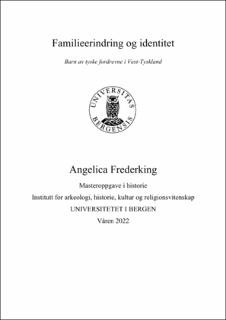| dc.description.abstract | In the aftermath of World War II approximately 12-14 million ethnic Germans were forced to leave their homes in Central and Eastern Europe. About 8 to 10 million of the expelled Germans settled in West Germany. The focus of this thesis is on the second generation of these expellees. Applying the methodology of Oral History, the study is based on ten qualitative interviews with people born in West Germany between 1947 and 1966 whose parents were expellees. The interviewees grew up in a time with great societal changes in West German society. During the first two decades after the war, there was a lot of public attention to the expulsion. Influenced by political reorientations, in particular the new Ostpolitik, public interest in the fate of the expellees declined in the late 1960s and early 1970s. In light of these changes, the children of the expellees found themselves in a challenging situation. On the one hand they were confronted with the memories and experiences their parents had gone through. On the other hand, they were exposed to the changes in public opinion and the lack of understanding for the expellee’s situation. This led to a certain form of disconnection and neglect towards their family history. For some of the interviewees this disconnection between themselves and their family memory has remained. For others, the interest for their parents’ story and experiences has grown stronger over time, especially when it became easier to visit the home region of their parents after the fall of communism. Some participants, however, found that the passing of their parents increased their interest towards their parents’ story. This study explores the intergenerational transmitted knowledge on this subject and how the parents’ experiences have been communicated and remembered within the family. The findings suggest that individual and collective memories are intertwined. In particular, a connection between the negative public opinion to this subject in the formative years of the interviewees, and their lack of identification and their unwillingness to be confronted with the parent’s story has become apparent. For the participants in this study the family stories about expulsion and the loss of Heimat were mainly seen as a private matter and had no place outside the family. | |
